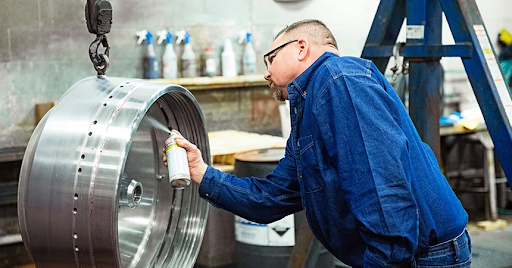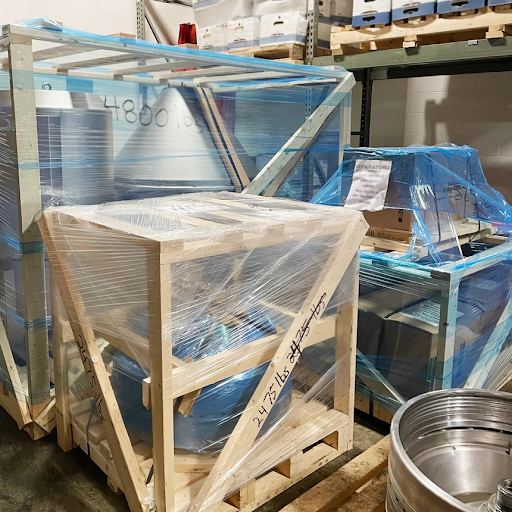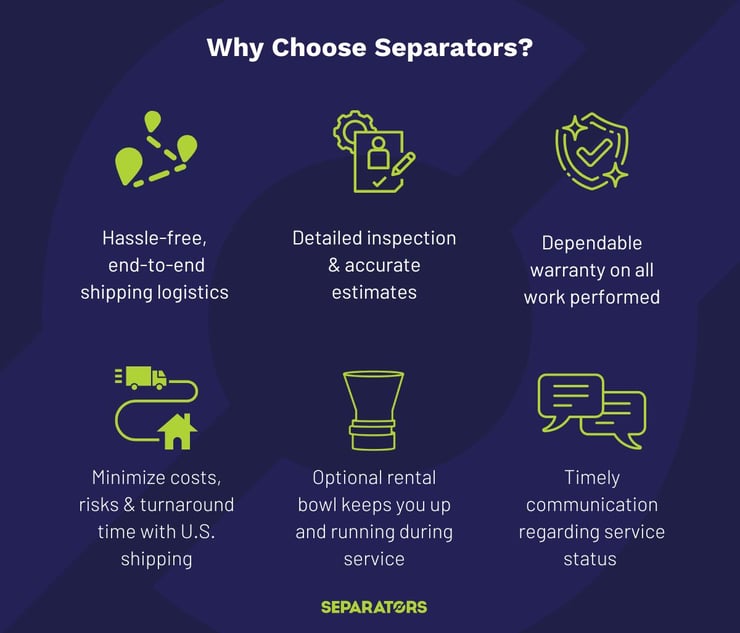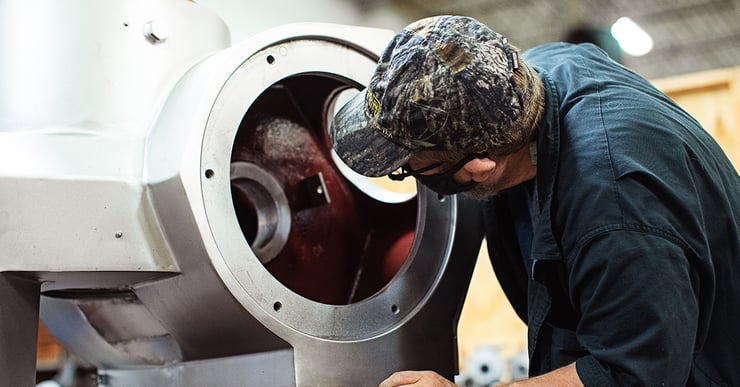While minor and major service visits can help keep your centrifuge in good working condition, wear and tear will require you to send in your bowl and other essential components for more extensive service over time.
By understanding the shop repair process, costs involved, shipping logistics, and what to expect, we can help you prepare for and execute your repairs with as little disruption as possible to your plant.
Which centrifuge repairs require shop service?
When you schedule minor or major centrifuge service, our field service technicians will record any findings in your service report, including any upcoming repairs that your centrifuge will require. Sometimes, these repairs can be completed right in your plant. But other times, the repair might require you to send in your bowl for repair and balancing.
Standard shop services include:
- Bowl shells (e.g., pitting, galling, fit, finish)
- Bowl components (e.g., sliding piston, disc carrier, lock ring)
- Lower frames
- Tubs and domes
- Pumps/impellers
- Disc compressors
- Bowl and frame tools
Preparing to ship your bowl for service
Worried about downtime while your bowl is out for repair? Our bowl rental program makes keeping your production volume goals on track easy. Our field technicians can help swap your bowl out for a rental bowl — plus, we’ll arrange shipping to send your bowl to our shop.
What happens when your bowl arrives at our shop?
Curious about what happens the moment your bowl arrives at our Indianapolis shop? Let’s walk through our process.
1. Initial inspection and estimate
When your bowl arrives at our shop, our experienced estimator will carefully inspect your bowl to identify the exact service needed to get it back to its best possible condition. We will identify any cracks or issues using a dye penetration test and report our findings.
Upon providing you with an estimate, we will also provide you with a promised delivery date when you can expect to have your bowl back at your plant.
2. Repair service
Because we don’t need to ship your bowl overseas, our repair process can usually be completed within a fraction of the time OEMs require. In fact, most services are finished within six weeks, while repairs to smaller parts, such as pumps, can be completed within a few days.

Our shop experts have decades of experience working on centrifuges — we’re proud to say that we’ve just about seen it all, and we use our experience to ensure that your repair will be effective and that our work will last.
3. Bowl balancing
Any repairs completed to your bowl will require us to balance it before you can use it in your plant. That’s why we balance every bowl, including testing with water, to ensure that it’s safely and properly balanced before we ship it back to you.
4. Bowl returns to your plant
We’ll carefully package your bowl and ship it back to your plant. Depending on your needs, we’ll arrange to have a service technician meet your bowl when it arrives at your plant to install it or swap it out and ship your rental bowl back to our shop.

Most centrifuge failures are preventable
Catastrophic centrifuge incidents happen more frequently than you’d think. And most separators find their way to our shop because something disastrous happened that forced the plant to stop the centrifuge and pull it off the production line.
Let’s say you perform minor maintenance to your centrifuge each year in-house, but you don’t have someone come in, open up the bowl, inspect the frame, and identify and complete necessary repairs. Without a centrifuge expert physically laying eyes on your bowl twice a year (and inspecting your frame once a year), chances are that your centrifuge will experience an event that requires emergency service to get back up and running — leaving you with unplanned downtime.
The cost of regular minor and major service is a drop in the bucket compared to the money wasted on lost product and unnecessary downtime when your separator experiences an issue. If your role depends on hitting production goals, this planned downtime far outweighs the downtime (and possible safety hazards) you’ll experience if you wait for a breakdown to get repairs.
Why choose Separators?
We know an OEM is always an option for your centrifuge bowl and parts — so why work with Separators?
Apart from the fact that we are 100% dedicated to centrifuges — and centrifuges only — you’ll also experience the following benefits when you service with us.

Schedule shop service today
Whether you’ve been waiting to take action on a needed centrifuge repair or have an immediate service need, our shop experts are here and ready to help you schedule service and arrange shipping to our Indiana shop.
Reach out especially if you're experiencing any of the following scenarios:
- High vibrations during operation
- Unusual noise levels
- Insufficient discharge
- Inefficient CIP process
- You're installing a centrifuge that's being shipped from another plant

